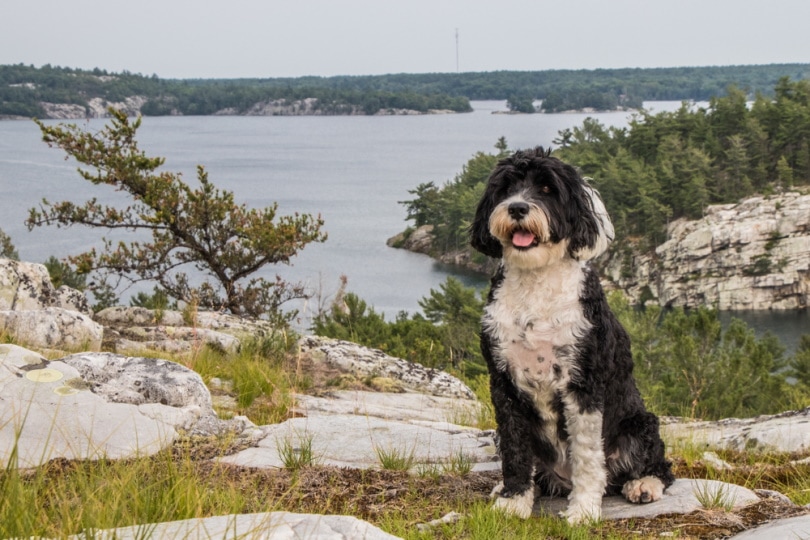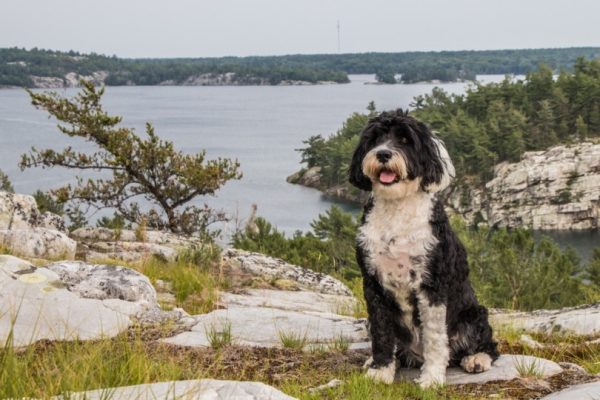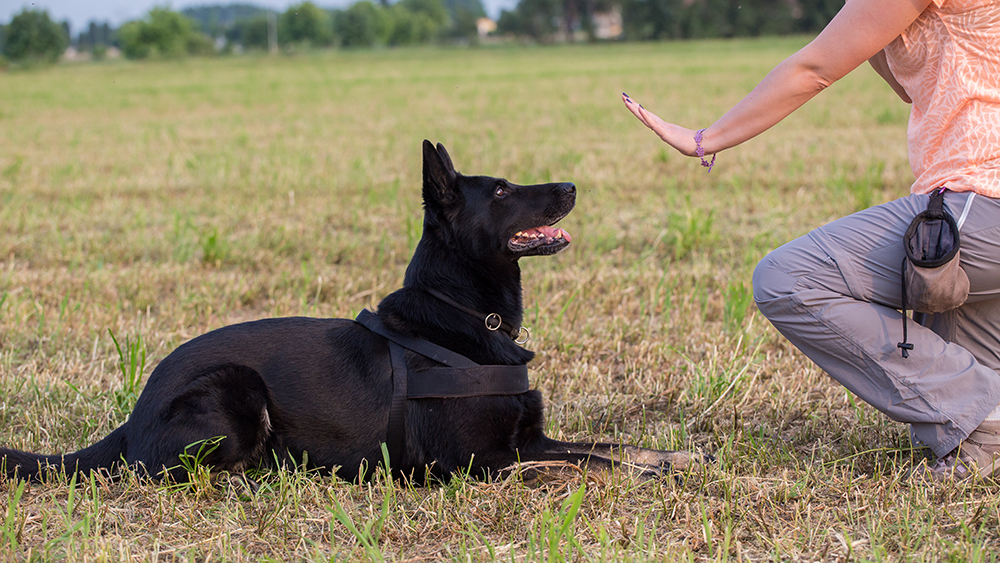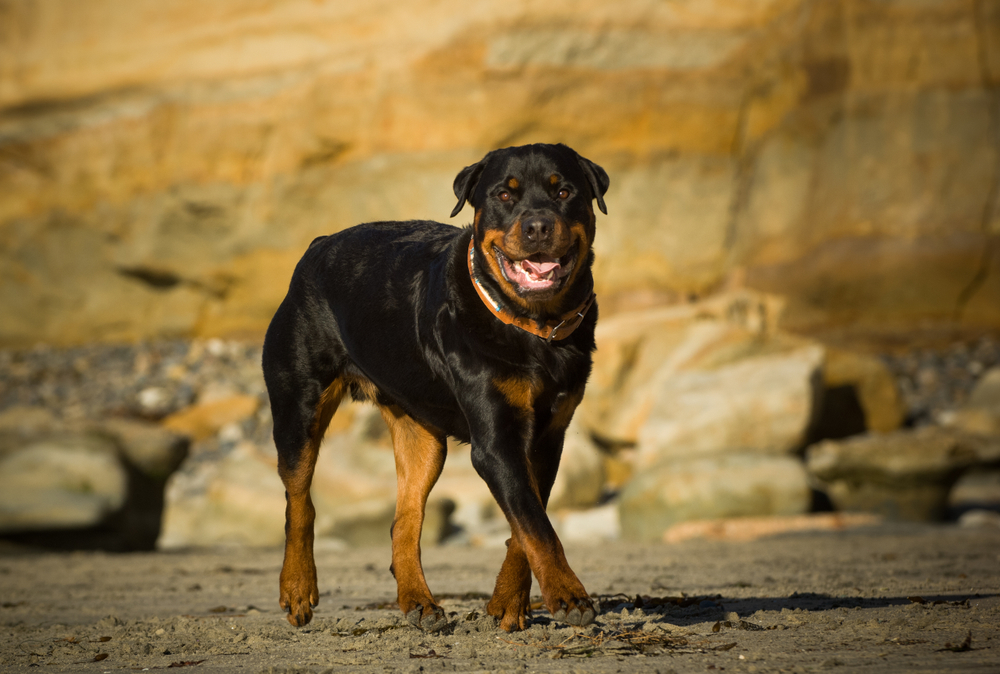Click Below to Skip Ahead
Portuguese Water Dogs may have been bred to be the right-hand dog for the fishermen in Portugal, but these lively and affectionate working dogs make perfect family companions, too. Portuguese Water Dogs, sometimes also known as PWDs or Porties, may not be the ideal dog for every family, but they certainly have a lot to offer. Read on to learn more about this interesting breed.
Breed Overview
Height:
17–23 inches
Weight:
36–60 pounds
Lifespan:
11–13 years
Colors:
Black, white, brown, black & white, white & chocolate
Suitable for:
Active families, people who enjoy spending time outside, experienced dog owners
Temperament:
Loving, independent, intelligent, eager, affectionate
The Portuguese Water Dog is an energetic, athletic, loyal, and affectionate dog breed. They combine the most redeeming qualities of a working dog with those of a top-notch canine athlete to offer unparalleled companionship, all wrapped up in a super cute package. There’s never a dull day with these highly intelligent and spirited pups around.
Portuguese Water Dog Characteristics
Portuguese Water Dog Puppies
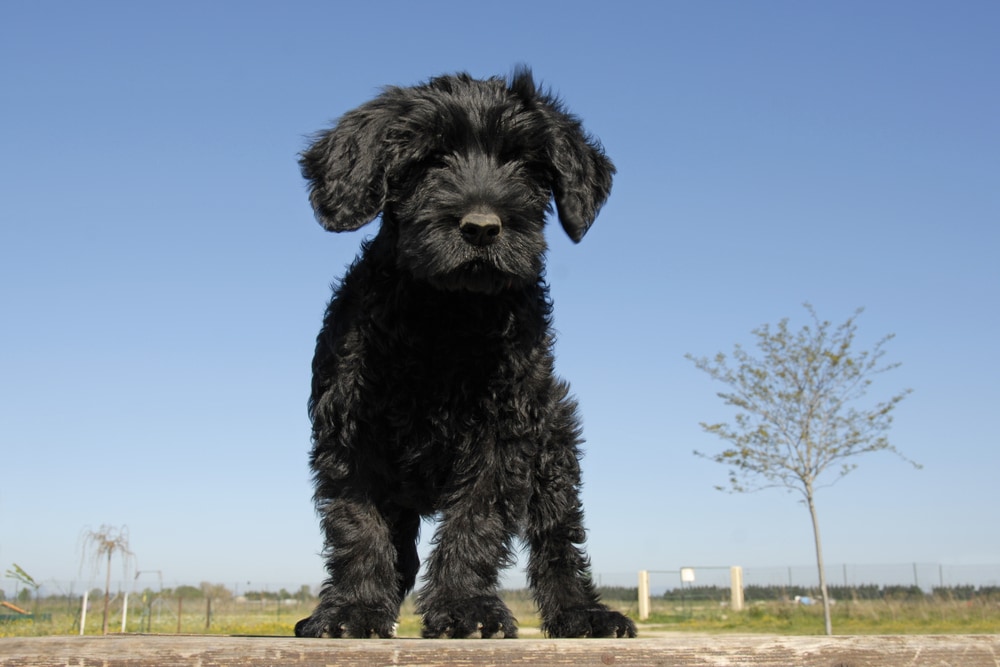
Portuguese Water Dogs are considered a relatively rare breed, though, at the time of writing, there are over 100 puppies listed for sale on the American Kennel Club Marketplace. However, it’s important potential owners do their due diligence before adopting a PWD puppy from a breeder. Never adopt from a breeder who cannot show proof of health testing, especially for GM1 (more about this in our Health section below) and other conditions like progressive retinal atrophy.
Though PWDs are generally very sweet and affectionate puppies, owners will need to begin training and socializing them as soon as possible. Do not wait until your dog is six months old to start training. An improperly trained Portie can be challenging to deal with, especially considering how intelligent they are. They can be prone to rowdiness in the form of exuberant jumping and destruction if not given enough physical or mental stimulation. Training is the answer to all of these problems, so it’s best to get a start on it ASAP.
Temperament & Intelligence of the Portuguese Water Dog 🧠
Portuguese Water Dogs are fun, affectionate, and playful companions. They enjoy romping around and participating in all sorts of activities. They are extremely loyal and loving toward their human family members, though they are prone to bouts of rambunctious doggy energy, which may make them less than ideal for homes with babies or young children.
PWDs love to stay close to their families, whether they’re inside or out. They are quite friendly dogs, but they do tend to form tighter bonds with one particular human. Porties adore attention and prefer being engaged in activities with their family members. They do not like being left alone for long periods.
PWDs are highly intelligent and very biddable, which makes them relatively easy to train as they’re very eager to please. However, they are self-willed and may become stubborn if they aren’t trained or socialized properly. They’re also very excitable, which is often noted when they jump to greet their owners or dance on their hind legs when excited. Some PWDs will even stand upright at the kitchen counter, especially if they catch a whiff of what their owners are cooking.
Are These Dogs Good for Families? 🏡
Portuguese Water Dogs make fantastic family dogs. They’re tender with the humans they care about most, and their good-natured temperament means they generally get along well with children. However, it would help if you considered the ages of your kids before introducing a Portie into the family.
Remember, these dogs can be quite strong and exhibit exuberant and excitable behaviors that may unintentionally injure particularly small children. You may want to wait until your kids are a bit older before bringing a PWD home, though we do always recommend supervising play between your dogs and children regardless of their age.
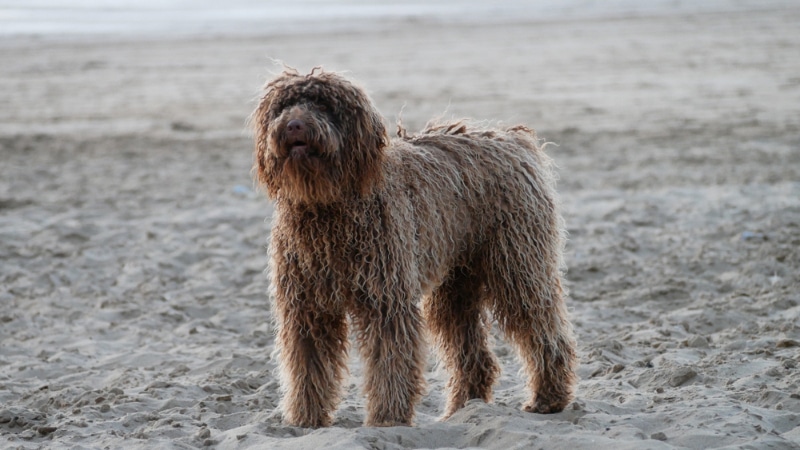
Does This Breed Get Along With Other Pets? 🐶 😽
Portuguese Water Dogs generally do well in households with other pets as they have a relatively low prey drive. However, if a Portie is introduced into a home with a resident cat, the transition may not go as smoothly. You’ll need to follow a proper introductory period, including keeping the animals apart and slowly introducing them over time, to increase the likelihood of peaceful cohabitation.
Things to Know When Owning a Portuguese Water Dog:
Food & Diet Requirements 🦴
A high-quality dog food diet appropriate for your pup’s current life stage is recommended for Portuguese Water Dogs. Some PWDs may be prone to gaining weight, so it’s important to keep a close eye on your pup’s caloric intake and activity level. Treats are a fantastic training tool but should only consist of 10% of your pet’s daily calories to avoid inadvertently causing weight gain.
How much and how often you feed your pup will depend on several factors. Most PWD puppies do best with three daily feedings, while adults are typically fed twice per day. The quantity will depend on your dog’s age, activity level, and health status. Your veterinarian can help you determine the best amount for your dog’s individual needs.
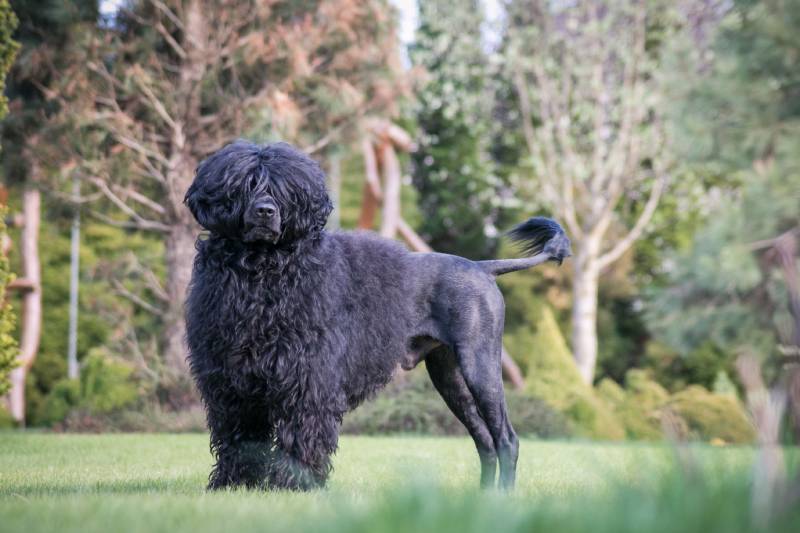
Exercise 🐕
The Portuguese Water Dog is a highly active and athletic breed that requires regular vigorous exercise to stay stimulated and happy. How exactly pet parents will exercise their pups will depend on their dog’s individual personality. Some are happy with long daily walks and play sessions, while others thrive in canine sports such as obedience and agility.
As you may have guessed from the breed title, PWDs absolutely thrive in water settings. They love swimming and dock diving and are generally happiest when spending time in the water.
Mental exercise is just as important as physical exercise. You’ll wear them out just as fast, challenging your PWD to use their high intelligence in mentally stimulating games and puzzles as much as you would take them for a long walk.
Training 🦮
Portuguese Water Dogs are highly intelligent and easy to train. Though they can be independent at times and can challenge their owner’s will and commitment to training, they generally respond well to obedience training. Because PWDs are working dogs, they’re content being at their owner’s side, awaiting directions and following complex commands.
One of the first jobs of the original Portie was to retrieve things, a job that required them to use their mouths a lot. Over time, their natural inclination to use their mouths to rip has become a breed trait. Owners need to teach their PWDs what they can and cannot use their mouths on. For example, nipping at their humans is not acceptable, but chewing certain toys or bones may be.
Positive reinforcement training is best for PWDs as they’re usually highly motivated by food. Rewarding good behaviors with high-value treats is a great way to communicate a job well done to your pup and mark the behaviors you want them to continue.

Grooming ✂️
The Portuguese Water Dogs’ coat is one of their most defining features. They can be wavy or curly but are always dense and profuse. The coat requires regular and extensive grooming to keep it looking its best. PWDs are prone to matting and will need to be brushed a few times per week at home in between regular visits to the groomer every four to six weeks. Despite how much fur the PWD has, they don’t shed much.
- Also see: Best Dog Conditioners
Health and Conditions ❤️
While Portuguese Water Dogs are generally healthy, they may be predisposed to several health conditions.
Hip dysplasia is an orthopedic condition that occurs when the hip’s ball and socket do not fit properly. Dogs with this condition may not be as active due to limited mobility and pain.
Addison’s disease is an adrenal gland dysfunction disorder that can develop in any dog regardless of whether they’re purebred or mixed breeds. However, Portuguese Water Dogs are one of seven purebred breeds that are predisposed to the condition. Thankfully, this condition is treatable, and if it’s caught early enough, patients can live normal, active lives.
Some congenital eye conditions are commonly seen in PWDs, including cataracts and progressive retinal atrophy (PRA). Cataracts can eventually cause vision loss if not treated. PRA has no treatment and can also impair an affected dog’s eyesight, but it can take months or even years for the disease to reach that point.
Porties may also be at risk of GM1 or gangliosidosis. This recessive genetic disorder can cause a fatal build-up of toxins in the nerve cells of affected puppies. Thankfully, a DNA test was developed that could test for this condition, and no affected puppies have been born in years. You should never adopt a puppy from a breeder who cannot show you written documentation of the pup’s parents’ GM1 status.
- Hip dysplasia
- Eye conditions
- GM1
- Addison’s disease
Male vs. Female
As with most dog breeds, the most significant difference between female and male Portuguese Water Dogs is size. The average height for a male Portie is between 20 and 23 inches, while females are slightly shorter at 17 to 20 inches. Males weigh between 40 and 60 pounds, while their female counterparts can be lighter, anywhere between 35 and 50 pounds.
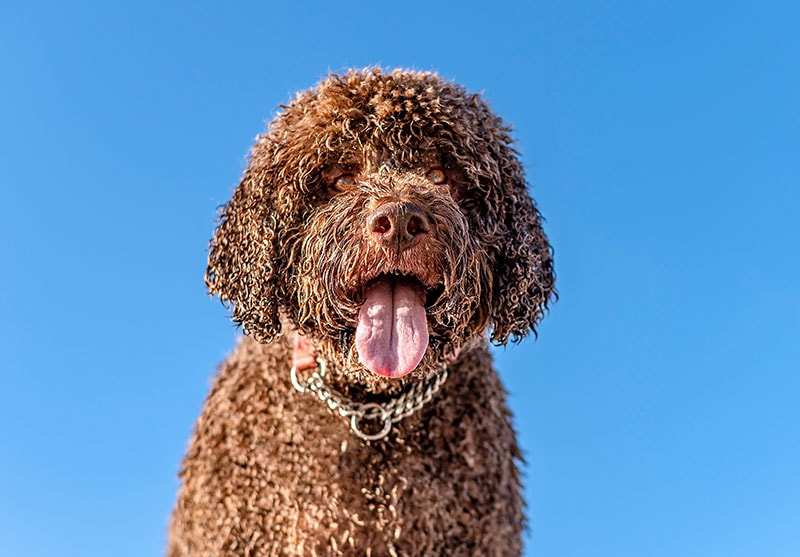
3 Little-Known Facts About the Portuguese Water Dog
1. They have webbed feet.
Portuguese Water Dogs were originally bred to herd fish into fishermen’s nets and retrieve lost tackle and broken nets. They worked closely with their fisherman owners and even evolved to have webbed toes and waterproof coats to help them with their water work.
2. They can excel at dog sports.
Pair the Portuguese Water Dogs’ high energy levels with their natural athleticism, and what you’re left with is a dog that’s practically born to excel at dog sports. PWDs are great at dock diving, agility, tracking, obedience, and coursing. These activities are great for expending excess physical and mental energy.
3. Politicians appear to love Portuguese Water Dogs.
Perhaps the most famous PWDs were Bo and Sunny, the former First Dogs of the United States. President Obama and his family adopted Bo in 2009 and Sunny in 2013. Senator Ted Kennedy had three PWDs who often tagged along with him to the office.

Final Thoughts
Portuguese Water Dogs are affectionate and loyal companions who enjoy being part of a family unit. They want to be involved in everything their humans do and may bond tightly with one family member in particular. These are highly social dogs that do not enjoy being left to their own devices for too long. This is something worth considering if you spend a lot of time away from home working or vacationing. You just may need to find a way to bring your pup with you to keep them happy and healthy.
As working dogs, PWDs have high energy requirements and do best in environments where their human family members prioritize physical activity. They are particularly fond of water activities and would love nothing more than swimming and participating in sports like dock jumping.
Their beautiful curly or wavy coats require a fair amount of attention, so potential owners should be prepared for regular brushing and visits to the groomer to keep them looking their best.
Porties are extremely intelligent dogs, which is good when it comes to training but may be a challenge for first-time dog owners to contend with. If you’ve never owned a dog before, you may want to consider a different breed, as PWDs have fairly high physical and mental stimulation requirements to stay happy and healthy.
- See also: What Kind of Dog Did Obama Have?
Featured Image Credit: Lynda McFaul, Shutterstock

